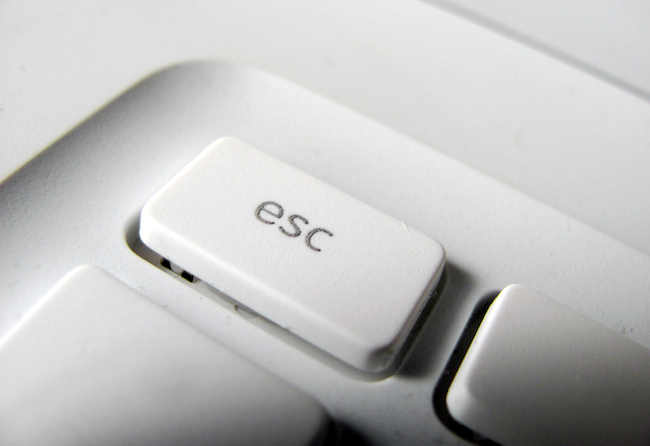
You may (or may not) have seen / heard about the updated Ofsted guidance about the quality of teaching. If you haven’t, then you were probably enjoying your Christmas – please read the post by Old Andrew – ‘A Christmas Miracle – Ofsted Get It Right For Once’
“Thanks to @ClerktoGovernor for being the first to point this out to me.
OFSTED published their Subsidiary guidance supporting the inspection of maintained schools and academies today.”
I didn’t really see it at the time as I was abroad and sans iPhone (I know! Important to take a tech break from time to time though…..). Anyway, in addition to the sections that Old Andrew refers to, there are supplementary subject-specific guidance for lots of different subjects including:
- Art, craft and design
- Economics, business and enterprise education due shortly
- Citizenship
- Design and technology
- English
- Geography
- History
- Information and communication technology
- Mathematics
- Modern languages
- Music
- Physical education
- Personal, social, health and economic education
- Religious education
- Science.
All of the different subject documents can be found here. You are obviously more than welcome to look at whatever subject areas you like, but I thought I should highlight some of the key points from the ICT section. Firstly, what is interesting is that the subject is still coined Information and communication technology; not Computing. What is really interesting too are the contents of the document (you can grab it directly from here in PDF format – there is a Word version).
It’s broken down in to five sections:
- the overall effectiveness of the subject
- the achievement of pupils in the subject
- the quality of teaching in the subject
- the quality of the subject curriculum
- the quality of leadership in, and management of, the subject.
It then goes in to each of those different sections and highlights what outstanding, good, requires improvement and inadequate practice might look like, with all of the grade descriptors too. What is particularly helpful (I think) is the Supplementary subject-specific guidance which appears in there alongside the generic guidance in some of the sections, making it subject specific for those areas. I strongly urge you to take a look.
Here are some screenshots from the guidance:
- Quality of the curriculum in ICT
Note in the quality of curriculum the SMSC requirement, the need for involvement of pupils, or at least opportunity of involvement for pupils across the whole school (Digital leaders??!) but visiting professionals, trips to relevant places where ICT use is pervasive and ubiquitous. One of the key messages here for me too, for an Outstanding department, is for there to be both academic and vocational options for students. Hallelujah. Another Christmas miracle. Are they forgetting the Wolf report? I don’t know, but it fills me with joy to see this in here.
Another great thing to see here is the mention of strong links with other subjects. I feel really strongly about the use of technology across the curriculum so when I saw the section below highlighted in pink – “the school is likely to have promoted the use of mobile technologies” alongside things like “ICT infrastructure enables pupils and staff to have very good access to their work” “and to the school’s learning resources at all times” there is, for me, quite a lot to feel encouraged by.
Don’t get me wrong. I don’t think BECTA is regrouping as I type, but there’s certainly recognition here of what great, no… outstanding ICT provision looks like. And if you’re a school looking to achieve it, you have a pretty clear roadmap in this document of the things you need to include in order to make it happen.
Check it out.
I’d love to hear your thoughts.

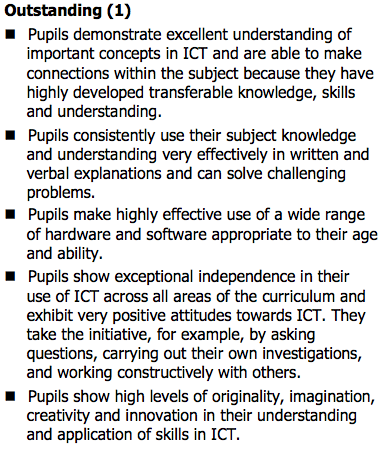
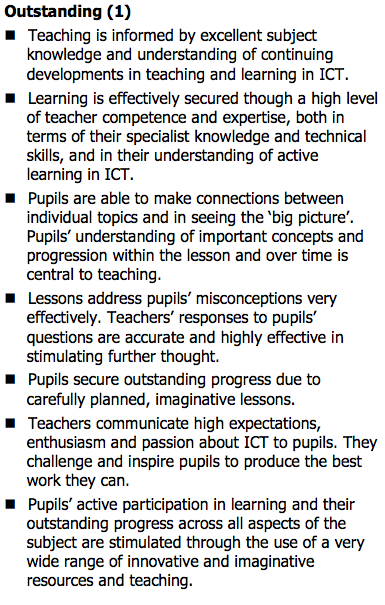
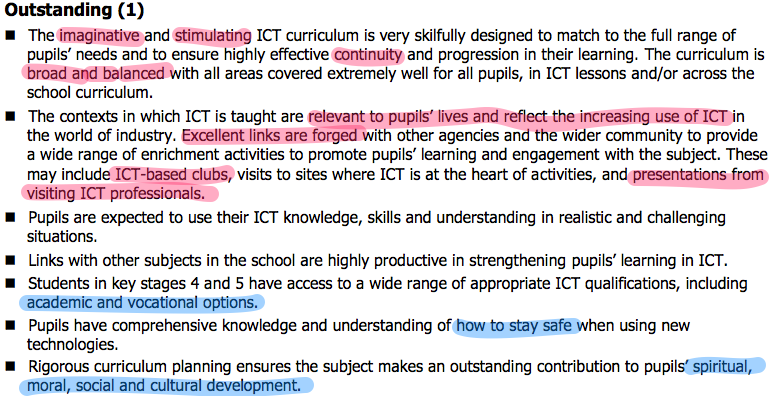
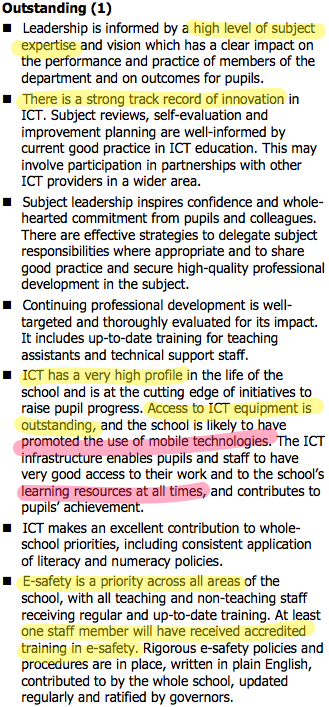











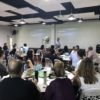


OK I hold my hands up, I was one of the guys who wrote the previous ICT curriculum for KS3 and KS4. I’t is great to see that OFSTED have taken a common sense and forward thinking approach. The good elements of the previous PoS have been kept in their advice and guidance whilst they have strengthened the use of, for example, mobile technologies which were only hinted ar before. A progressive move from them, long may it continue.
This does not really answer the question most teachers are asking. What does good ICT look like?
Do we demonstrate or use flipped learning resources to enable pupils to navigate software in lesson and outside of lesson?
Do we teach computing or ICT!?
Most teachers are ridding the old curriculum, which is right. However, the ICT GCSE has not changed, so we still have to cover databases and spreadsheets etc.
Great reading, thanks for posting!
Great info, thanks Mark.
Great post, and I’m glad you took screenshots and put them here for posterity, because only a year later and the OFSTED website has been largely subsumed into .gov.uk. This is probably not a bad thing, but the standardisation of documents does make it harder to find what you are looking for. The links you posted a year ago are now dead, and the new .gov.uk document search only throws up two docs relevant to ICT, “ICT In Schools: 2008 to 2011” and “Making the most of information and communication technology in school”, which is a case study on a school.
So yes, I can’t find subject-specific guidance for ICT. On Google I’ve found a few links to old .pdf files, not sure if these are considered current.
Any ideas?
Hi Mat – I have got some ideas because the old documents are archived. I can’t remember the location at the moment though. I’ll give it some thought and get back to you. If I don’t (and forget), give me a nudge!
Thanks for taking the time to respond.
Mark
Will do – many thanks!